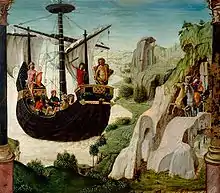Argo
In Greek mythology, Argo (/ˈɑːrɡoʊ/; in Greek: Ἀργώ) was the ship on which Jason and the Argonauts sailed from Iolcos to Colchis to retrieve the Golden Fleece.


Name
Most accounts name the ship after her builder, Argus. Cicero suggested that it was named after the "Argives", a term for the Greek people commonly used by Homer. Diodorus Siculus reported that some thought the name was derived from an ancient Greek word for "swift".[1][2]
The adjective, occasionally found,[3] is Argoan /ɑːrˈɡoʊən/,[4] from Greek Ἀργῶος through Latin Argōus.[5]
Legend
Argo was constructed by the shipwright Argus, and its crew were specially protected by the goddess Hera. The best source for the myth is the Argonautica by Apollonius Rhodius. According to a variety of sources of the legend, Argo was said to have been planned or constructed with the help of Athena. According to certain sources, Argo was the first ship to sail the seas. It was Athena who taught Tiphys to attach the sails to the mast, as he was the steersman and would need an absolute knowledge of the workings of the ship.[6] According to other legends, she contained in her prow a magical piece of timber from the sacred forest of Dodona, which could speak and render prophecies.
After her successful journey, Argo was consecrated to Poseidon in the Isthmus of Corinth. She was then translated into the sky and turned into the constellation Argo Navis.[7]
A beam fell from the top of the ship and killed Jason sleeping on the ground. [8]
Several authors of antiquity (Apollonius Rhodius, Pliny,[9] Philostephanus) discussed the hypothetical shape of the ship. Generally she was imagined like a Greek warship, a galley, and authors hypothesized that she was the first ship of this type that had gone out on a high-sea voyage.[7]
References
- Lemprière, John (1825). "A Classical Dictionary: Containing a Copious Account of All the Proper Names Mentioned in Ancient Authors".
- ), Diodorus (Siculus (1814). "The Historical Library of Diodorus the Sicilian: In Fifteen Books. To which are Added the Fragments of Diodorus, and Those Published by H. Valesius, I. Rhodomannus, and F. Ursinus".CS1 maint: numeric names: authors list (link)
- e.g. Robert Cooper Seaton (1912), Rhodius Apollonius: The Argonautica, p. 339
- Noah Webster (1832) A Dictionary of the English Language
- Argo. Charlton T. Lewis and Charles Short. A Latin Dictionary on Perseus Project.
- "The Argo". Jason and the Argonauts. Retrieved 2016-04-10.
-
 This article incorporates text from a publication now in the public domain: Chambers, Ephraim, ed. (1728). "Argo". Cyclopædia, or an Universal Dictionary of Arts and Sciences (1st ed.). James and John Knapton, et al. p. 132.
This article incorporates text from a publication now in the public domain: Chambers, Ephraim, ed. (1728). "Argo". Cyclopædia, or an Universal Dictionary of Arts and Sciences (1st ed.). James and John Knapton, et al. p. 132.
- Euripides; Murray, Gilbert (1912). The Medea. Translated into English rhyming verse with explanatory notes by Gilbert Murray. Robarts - University of Toronto. New York Oxford University Press. pp. 77–78, 96.
- Hist. Nat. 1.c.56
External links
| Wikimedia Commons has media related to Argo. |
- Voyage of the Argo – slideshow by The First Post